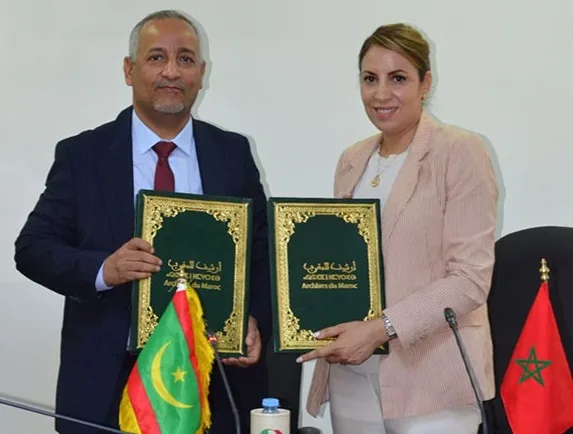Morocco and Mauritania have formalized a partnership aimed at strengthening collaboration in the field of archival preservation. The agreement was signed late last week at the headquarters of the Moroccan Archives Foundation in Rabat, marking a key development in the management of documentary heritage between the two countries.
Representing Mauritania, Mohamed Mokhtar Sayed Mohamed El Hadi from the National Documents Office signed the accord, while Latifa Mouftakar, Director of the Moroccan Archives Foundation, represented Morocco.
The agreement establishes a framework for joint efforts in collecting, preserving, and enhancing public archives, with a focus on shared historical, cultural, and administrative records. It outlines cooperation in professional training, digitization, conservation center management, historical research, and broader public access to archival materials.
The deal also promotes regular exchanges between Moroccan and Mauritanian experts, collaborative scientific publications, and cultural events that highlight the importance of archives in shaping national narratives.
The signing was witnessed by Nani Ould El Houssein, Cultural Counselor at the Mauritanian Embassy in Rabat, and Mohamed Fathi, Head of International Cooperation at the Moroccan Archives Foundation.
Mauritania has entered into similar agreements with Tunisia, Algeria, Turkiye, Oman, Saudi Arabia, and Portugal, underscoring its commitment to cross-border archival collaboration.
This new accord comes amid strengthening diplomatic ties between Rabat and Nouakchott. A meeting in December between Morocco’s King Mohammed VI and Mauritanian President Mohamed Ould Ghazouani reflected the improving relationship between the two nations.
The broader Morocco-Mauritania relationship is seen as pivotal for regional integration. Situated at the crossroads of North Africa and the Sahel, both countries face shared security challenges, including terrorism, organized crime, and irregular migration.
Mauritania continues to navigate a careful diplomatic path, particularly on the Western Sahara issue. It has maintained a position of “positive neutrality,” avoiding explicit support or opposition, in order to preserve constructive relations with both Morocco and Algeria.
Economic cooperation further reinforces bilateral ties. Key initiatives like the Nigeria-Morocco gas pipeline, which is set to pass through Mauritania, reflect growing interdependence that extends beyond political alignment.
The Moroccan Archives Foundation, established under Law No. 69.99, plays a central role in safeguarding the nation’s archival heritage. Founded during Morocco’s reconciliation efforts in the early 2000s, the institution collects, preserves, and provides access to the country’s historical records. Since 2012, it has held the designation of a strategic national institution.
Its core responsibilities include the development and organization of national archives, standard-setting for archival processes, promotion of archival research, professional training, and international cooperation—all vital to preserving Morocco’s documentary legacy.



